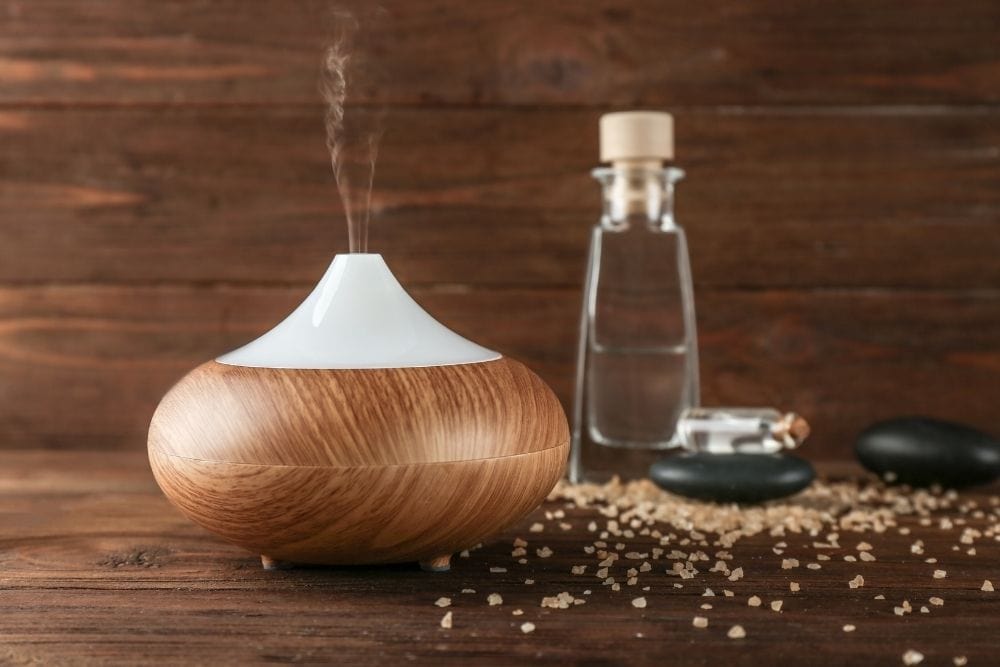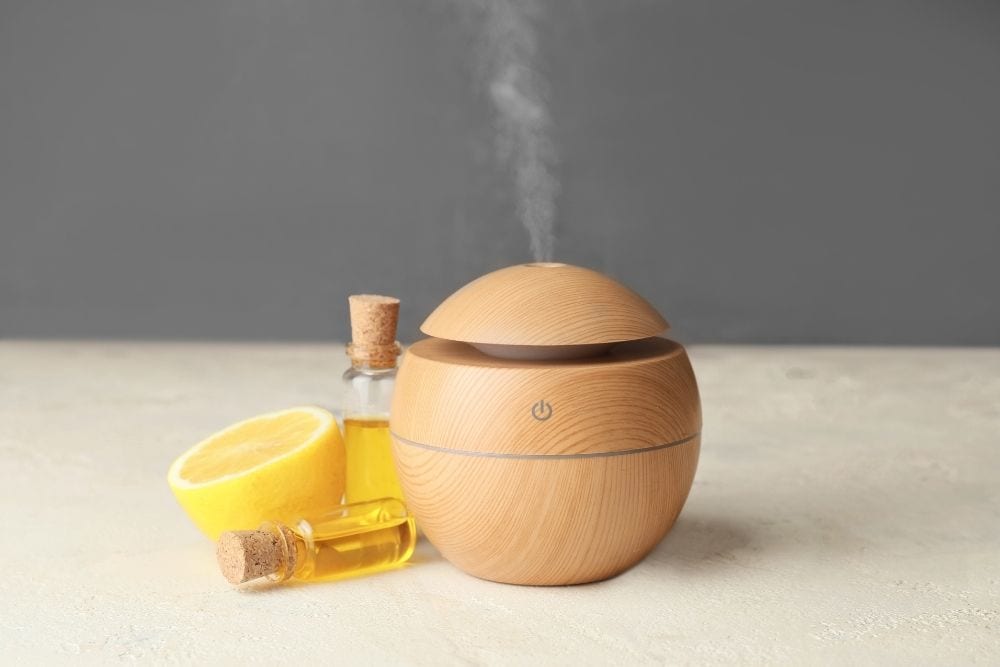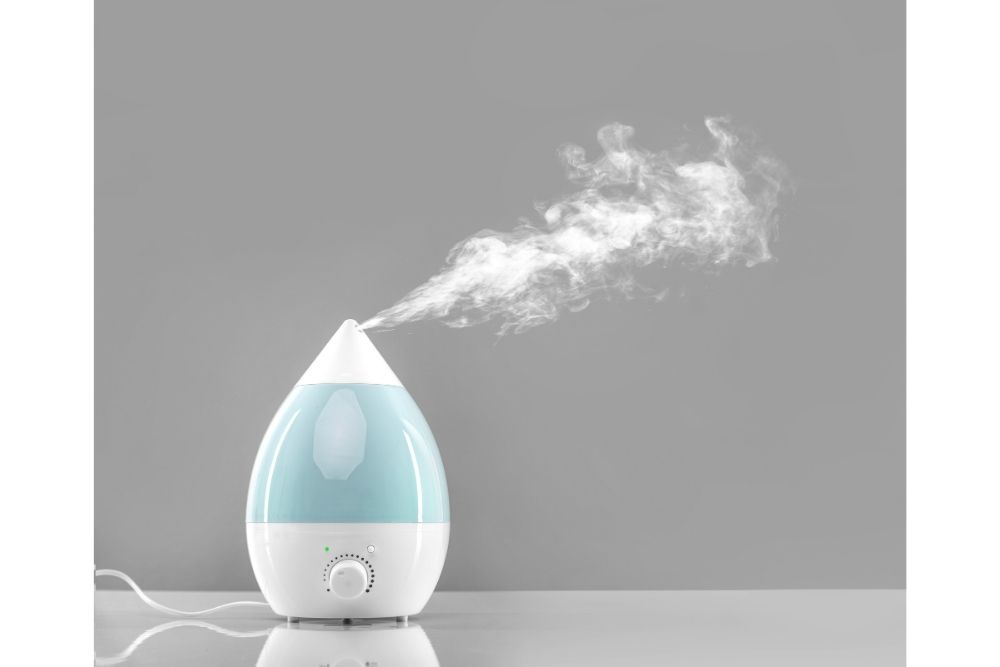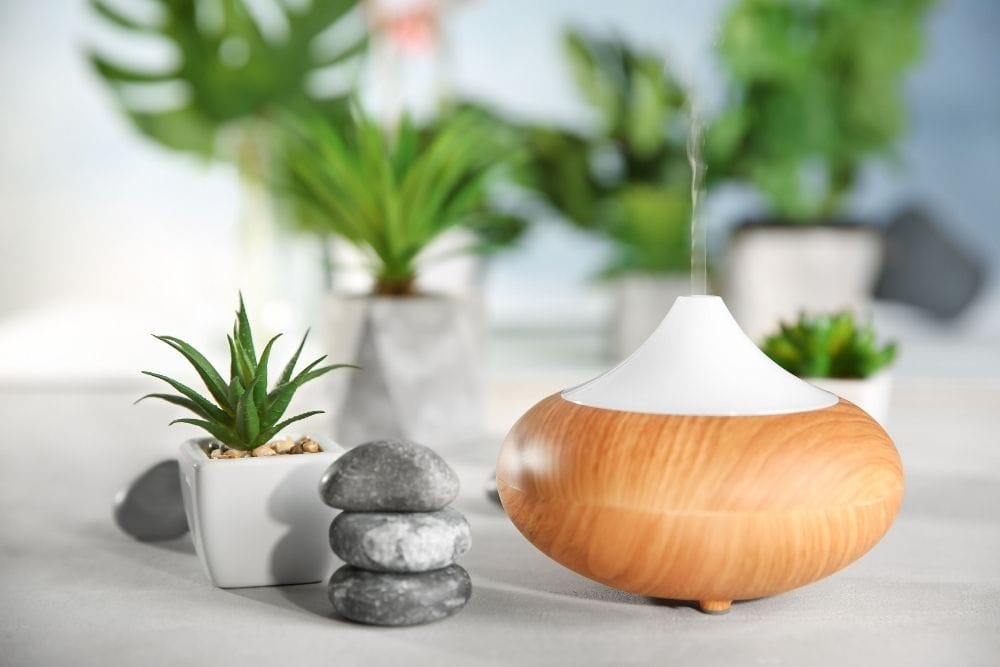Have you ever wondered if a diffuser adds moisture to the air? Should you use a diffuser or a humidifier to add moisture to your home?
Yes, a diffuser adds a small amount of moisture to the air. However, the moisture contains essential oils as opposed to a humidifier.
There are many benefits associated with essential oils, and you can get all of them by using a diffuser in your home.
The diffuser spreads essential oils in a room in the form of moisture which mixes with the surrounding air. When you breathe in the air, you get all the benefits of the essential oils.
Contents
Why is Moisture Crucial In The Air Around Your Home
Research shows that the ideal relative humidity you should maintain in your house should be 30-50%.

Low humidity is not good for your health as it causes dry skin, makes your eyes feel itchy and dry, and irritates your throat and nasal passages.
However, higher humidity levels may lead to the growth of mold and bacteria, which causes health problems such as allergies and respiratory issues.
But how does a diffuser add moisture to the air?
Here is a breakdown of how different types of diffusers work to spread essential oils fussed moisture to the air.
How Different Types of Diffusers Add Moisture to the Air?
There are different types of diffusers, each of which utilizes a unique technique to spread essential oils infused moisture into the air. They include:
1. Nebulizers
A nebulizing diffuser uses the high speed to jet out a stream of air to disintegrate the essential oils into small particles. After the gadget breaks down these particles, it releases them into the air in a misty-like form.
Nebulizing diffusers have one significant advantage; they do not consume heat or use water solvent but can still effectively spread all the essential oils.
2. Ultrasonic
Unlike nebulizing diffusers, ultrasonic diffusers use electronic frequencies to break down a mixture of water and essential oils into mist spreadable in the air.
Every ultrasonic diffuser has a built-in disk that creates the ultrasonic vibrations responsible for breaking the mix into tiny particles.
3. Heat diffusers
Just as its name suggests, a heat essential oil diffuser depends on heat so that it can evaporate the oil into the air.
Some even require you to add water to the oil. Some are also specifically designed to use extreme heat levels so that the mist released releases a more aromatic scent.
Others use minimal heat so that they don’t tamper with the chemical composition of the oil.
4. Evaporating
These diffusers use the evaporative diffusion process. This is where the airflow spreads the oil particles throughout the house.
A fan blows the air through filters with deposits of essential oils, causing the oils to evaporate and get blown throughout the room.
Is the Moisture From a Diffuser Safe for Your Health?
The moisture dispersed by a diffuser is perfectly safe for your health. In fact, it has more benefits than moisture from a humidifier.
The benefits of the moisture depend on the essential oil you will add to the diffuser.
Advantages of Diffuser Moisture

- It helps to relieve stress
- It helps in relaxing and calming your mind
- It helps to improve immunity
- It helps to improve sleeping patterns
- It helps in decongesting your respiratory system
However, you should be aware of any know allergies to prevent possible reactions from the diffuser moisture.
Differences Between a Diffuser and a Humidifier
A humidifier adds moisture into the air by dispersing mist, while a diffuser’s main purpose is to infuse essential oils into the air.
1. Types of humidifiers
Humidifiers are larger and can hold up to a gallon of water. On the other hand, diffusers hold about 150-300ml of water.

A diffuser can mix essential oils with water, while humidifiers don’t have that ability.
There is a variety of humidifiers, namely:
- Central humidifiers are in-built into the residence and thus are part of the existing ventilation systems.
- Ultrasonic humidifiers yield a cool spray of water vapor just after water in the machine has undergone ultrasonic vibration.
- Impeller humidifiers use a rotating disk to generate water vapor jets.
- Evaporators use a fan to blow air through a moist wick, belt, or filter to add humidity to a room.
- Steam vaporizers produce steam, and the jet is cooled back to water droplets before leaving the device.
2. Moisture Content
The moisture from a humidifier is plain water without any added constitutes. Therefore it’s less beneficial as compared with moisture from a diffuser that contains essential oils.
It would be best if you used a diffuser to add moisture to your home, as it will also help improve your health in the process.
3. Benefits
Moisture from a diffuser has more benefits than a humidifier. This is due to the essential oils you add to a diffuser.
However, you can add essential oils to a humidifier. But adding essential oils is not advisable as this can damage your humidifier.
Some humidifiers have an essential oils tray where you can add your favorite oils.
Parting Shot
Using essential oil diffusers is a simple, mess-free, and convenient way to reap the many benefits of essential oils. Besides, diffusers add a significant amount of moisture to the air.
Therefore, the diffuser moisture has more benefits, such as relieving stress and relaxing the mind. On the other hand, a humidifier improves the humidity of a large room or the whole house.
Overall, selecting a suitable diffuser for your home will fill the air with pleasant aromatic moisture and provide an uplifting atmosphere. Why not get yours right away?

I currently work as a medical receptionist, but my ultimate goal is to work as an occupational therapy assistant. Helping others achieve a better quality of life is something I’m after. That’s one of the main reasons I started this blog. Learn more about me.



